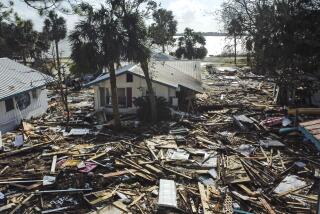It’s a short day at the Republican convention
SAINT PAUL, MINN. — Republicans convened their national convention Monday in a session truncated by a hurricane and roiled by vice presidential candidate Sarah Palin’s revelation that her 17-year-old daughter is pregnant.
John McCain’s campaign sought to keep the focus on the emergency response to Hurricane Gustav, limiting partisan functions and parties to underscore that Republicans would not repeat 2005’s much-criticized response to Hurricane Katrina.
Republican National Committee Chairman Mike Duncan opened the convention by urging delegates to take out their cellphones, then giving them a number to call to donate to the Gulf Coast relief effort.
Concerned that voters might get the impression that the party was not concerned with Gustav victims, officials timed the opening day’s proceedings to take place before network news shows aired.
President Bush had been scheduled to speak at the convention Monday. But party leaders said he was staying away to oversee the emergency response in Louisiana and the other gulf states. Four gulf state governors spoke to the convention by video, assuring viewers they were at the ready.
First Lady Laura Bush escorted Cindy McCain onto the stage, getting a cowboy salute from the Texas delegates, who stood and waved their cowboy hats.
Laura Bush stood behind a simple podium with a huge television screen showing an American flag as the backdrop. She pumped her fist as she spoke Alaska Gov. Sarah Palin’s name, and delegates vigorously applauded.
Cindy McCain quoted her husband, saying, “This is the time to take off our Republican hats and put on our American hats.” She urged people to donate to various relief funds, as did Laura Bush and other party leaders at the Xcel Energy Center.
The two women, who spoke for five minutes between them, both received standing ovations.
Within 20 minutes of the first lady taking the stage, the opening day’s session came to a close. Details of today’s session depended on the level of damage from Gustav.
In the brief session, delegates adopted a platform that runs 67 pages. It includes planks supporting abstinence education in schools, a view that life begins at conception, and a constitutional amendment defining marriage as between a man and woman.
“We renew our call for replacing ‘family planning’ programs for teens with increased funding for abstinence education, which teaches abstinence until marriage as the responsible and expected standard of behavior,” the platform says.
“Abstinence from sexual activity is the only protection that is 100% effective against out-of-wedlock pregnancies and sexually transmitted diseases, including HIV/AIDS when transmitted sexually.”
Connie Mackey, senior vice president of the Family Research Council -- an antiabortion group -- hailed the platform as “the most conservative” ever. She also dismissed the pregnancy of Palin’s daughter as a “blip on the screen.”
The chairman of the platform committee, Rep. Kevin McCarthy (R-Bakersfield), called the document the “people’s platform.” It also includes planks calling for a strong national defense and development of American energy sources, and refers to “the incompatibility of homosexuality with military service.”
The document urges completion of the border fence to limit illegal immigration from Mexico. It opposes amnesty for illegal immigrants and opposes such benefits for them as driver’s licenses and in-state tuition rates.
McCain has not embraced some of the platform’s positions, including the call for a federal constitutional amendment to ban same-sex marriage. Nor has he taken as strict a stance on the illegal immigration issues.
Like McCain, Democratic presidential nominee Barack Obama altered his normal campaigning Monday. Traveling in Michigan, he scrapped his stump speech and asked supporters to contribute to the local Red Cross. The Obama campaign was gathering volunteers in the event that they might be needed on the Gulf Coast.
“Today is not a day for political speeches,” Obama told thousands who came to see him in Detroit.
He did not abandon his political message altogether. He drew parallels between the Gulf Coast hurricane and the economic suffering of Americans.
“A lot of people here in Michigan are going through a quiet storm,” he said in Monroe. “Whenever a plant closes and people are laid off and they don’t know which way to turn, that’s a quiet storm.”
Times staff writer Noam Levey in Michigan contributed to this report.
More to Read
Sign up for Essential California
The most important California stories and recommendations in your inbox every morning.
You may occasionally receive promotional content from the Los Angeles Times.









